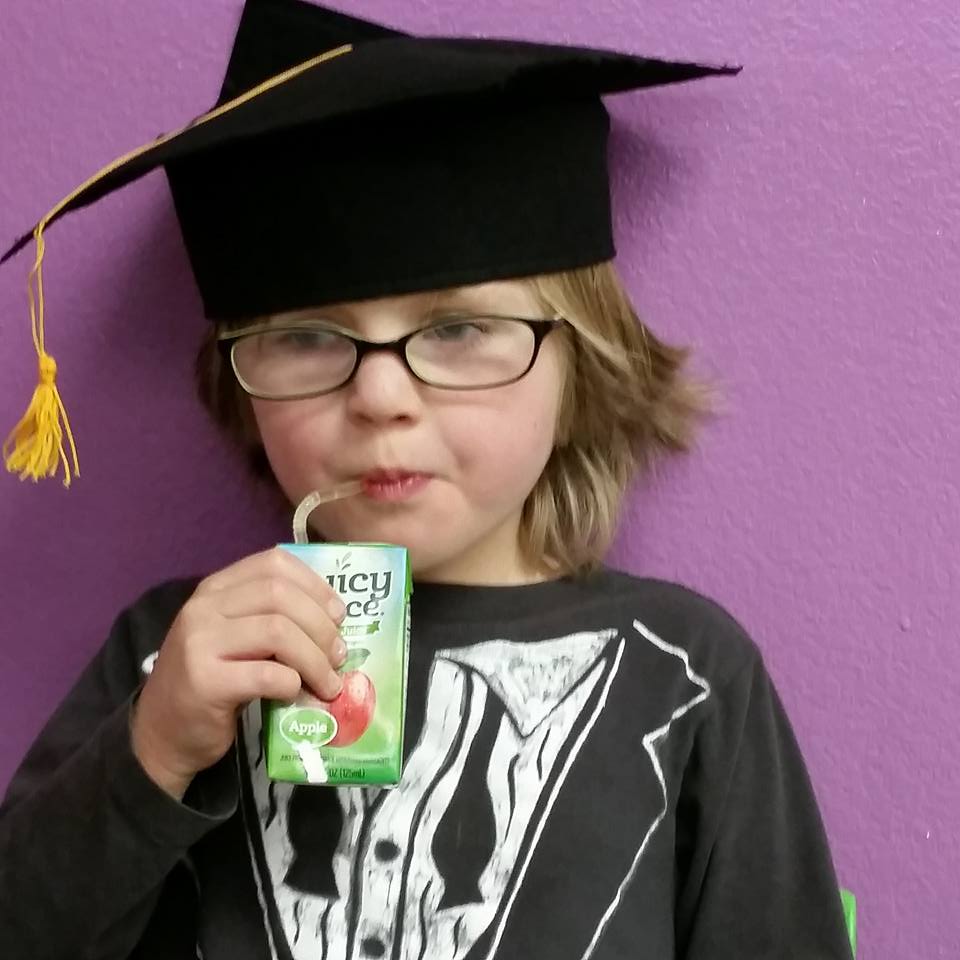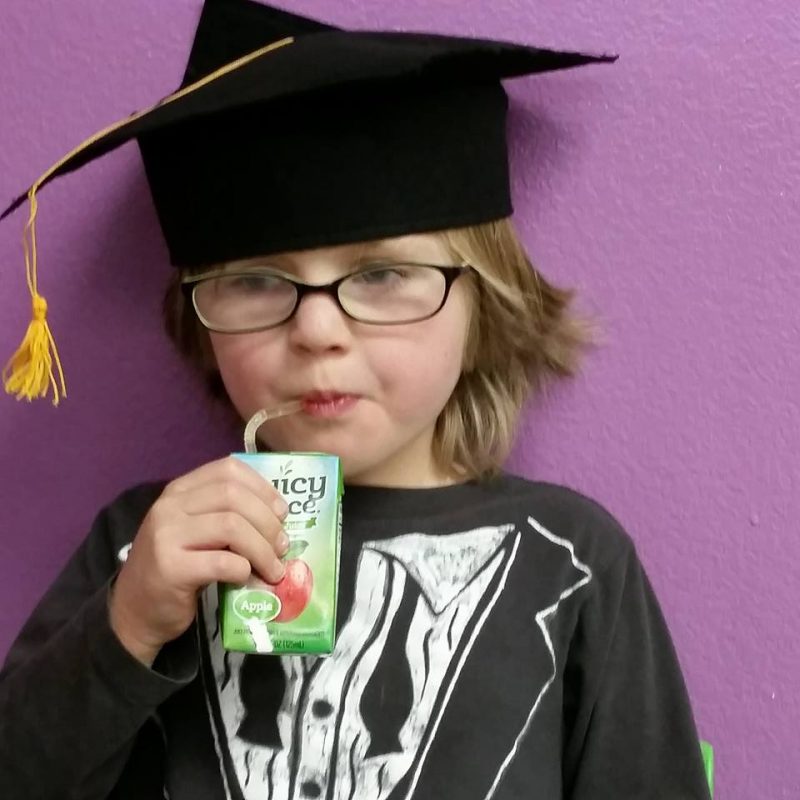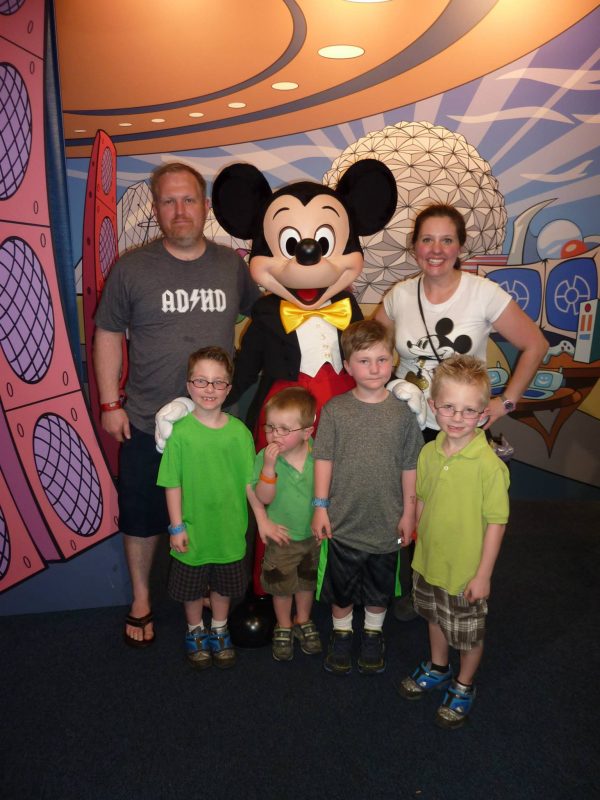I leaned my back against the wall, and slid down to the floor. I let the sobs overwhelm me, and match the volume of my son who was kicking and screaming on the hardwood floor beside me.
I felt completely inadequate as a mother.
I had heard people joke about the terrible twos, but I knew that this was different.
I had survived ages two, three, and four with my triplet boys already. It had never been like this.
It was more than a disobedient child refusing to get dressed or put on his shoes. I knew that there was something different about PB and the way that his brain was wired compared to my other boys. I knew that I needed to help, and decided to research the internet for Sensory Processing Disorder.
I had heard the term used a lot in articles I had read about parenting children with autism. I didn’t suspect that PB had autism, but he had a lot of the same characteristics the articles described. I knew that I needed to learn more about what was bothering my son to be a better parent, and to prevent exhausting, daily melt downs for both of us.
Once I realized what SPD was, I was able to pinpoint situations which were causing major meltdowns for my son. Knowing what was happening reduced power struggles, embarrassing public meltdowns, and improved the peace in our home.
Here are some things that I did to help my son cope with some of his sensory issues:
I bought clothes he wanted to wear.
With three older brothers, I had plenty of adorable outfits for PB to wear, and he hated most of them. Getting dressed everyday was a monumental struggle where we both ended up in tears. I bought him what was comfortable on his skin, even though I preferred how other outfits looked. He liked long sleeved 100% cotton t-shirts with no collars, buttons or tags. He liked athletic pants without elastic around the ankles or sweatpants. He didn’t like to wear socks, so I didn’t make him.
I changed my idea of what “being dressed” means.
If we weren’t leaving the house, I let him wear pajamas. His body was covered, and he was warm enough. Sometimes, he wore them in public when he wasn’t even sick. Some times he wore the same outfit for 48 hours before allowing me to wash it. Sometimes he didn’t match. It was okay. We were able to leave the house without as many huge meltdowns, and I consider that a win.
I let go of the expectations I had as a parent about some things.
One day, instead of saying, “No, you can’t wear a Batman cape. Costumes, are for home only,” I said yes. After that, PB wore his black fleece Batman cape nearly everywhere for the next year. We compromised by not wearing it to bed for safety reasons, or to church on Sunday to show reverence to God, and avoid my embarrassment. Strangers complimented his style and loved it.
I had to physically hold a screaming PB down to cut his hair with the clippers every month. It was torture for both of us. He didn’t like the sound of the clippers or the feel of the cut hair on his skin. I listened to him. I used the scissors instead of clippers and gave him longer styled haircuts. I took my time, and made sure the water didn’t trickle down his neck from the spray bottle when I wet his hair. I moved each clump of cut wet hair so it wouldn’t rest on his skin and cause irritation.
Sometimes, when I cut PB’s hair with the scissors, it was crooked, and he was done even though I wasn’t finished. He had sat in the chair as long as he could. We left it that way, until it was time for a new haircut. Eventually, he sat for longer periods of time, and trusted me more, because I listened to how he felt. These were little things that I did as a parent that made a big difference in our relationship.
It was also helpful for me to understanding how common SPD is among gifted people.
As I read more about SPD symptoms, a few years ago, and filled out a questionnaire for a research institute to help specialists learn more about how to treat it, I realized that I have it too. In fact, five of my 40 fears are directly related to my own sensory processing issues.
10. Swimming – It’s not just having to wear a swimsuit and body image issues. I don’t like the feeling of water in my ears. I don’t like having my face completely immersed in water, because it makes me afraid of drowning. I don’t like the pressure of water on my face.
11. Eating meals with people – I have misophonia. Eating sounds trigger involuntary anger. It’s worse around people I know well and love. This can be especially challenging around the holidays which are centered around communal eating experiences.
18. Being in loud places – I especially have a difficult time with ambient noises and echoing places like gymnasiums.
28. Being dirty – I don’t mind being sweaty. I don’t have to bathe or shower everyday. I don’t compulsively wash my hands. I have a difficult time with the way that dirt or certain things feel on my skin… especially my hands. I didn’t like making mud pies as a child or finger painting. I never liked having my hand stamped to get into a club. I don’t like temporary tattoos, or writing a reminder on my hand. I love the ocean and walking on the beach, but don’t like how sand feels on my legs or body. (I am okay with it on my feet and love the way it feels between my toes if it’s wet.)
Moments before this picture, PB was screaming, because he dumped his bottled water on his shorts. I broke down crying three times because I wanted a lemonade, I was hot, tired and around a lot of people.
32. Being around crowds of people- I feel physically trapped by swarms of people. It makes me feel anxious to have so many bodies in close proximity to my own. Sometimes, I am okay attending a large sporting event in an arena, a conference or convention. Other times, I feel extremely anxious and overwhelmed. I had more than one sensory meltdown on our trip to Disney World in 2013. Combining loud and crowded places? Not good at all.
Tips that have helped me cope with my SPD
Getting enough rest – I don’t like to sleep. There are so many other things that I would rather be doing. I have noticed if I am sleep deprived, my SPD symptoms are amplified and unbearable. (Not only for me, but my family as well.)
Regular Exercise – Physical movement helps me focus and relieves a lot of my stress and anxiety. I don’t like to exercise, but I do it because I like how I feel when I am done. Running makes me a better mom.
Eliminating/ Reducing Caffeine and Sugar – I have noticed that I am more irritable and sensitive to my environment when I have too much caffeine or sugar. Most energy drinks wreck havoc on my brain too. I have been caffeine free since November, and have noticed a big difference in my SPD. I have limited my processed sugar intake as well. I won’t eliminate it, because I love sugar, but choose to have most of it now through less processed methods. I still love peanut butter M&Ms and ice cream, so yeah….I have noticed increased anxiety levels when I overload or over do it.
Genealogy Jen’s Challenge of the Week– How has something different about you or the way your brain works become a strength? Comment and let me know
This post is part of Hoagies’ Gifted Education Monthly Blog Hop Series. This month’s topic is the Mysteries of Giftedness. Please click the graphic below to read more about the mysterious workings of the gifted brain.





Wow! Is that what’s wrong with me? LOL I don’t like crowds either and I so despise the way people eat and the sounds that go with. I’ve curbed that by not looking at people while they eat. I talk louder than normal and look only at their eyes – never their mouth or I might puke!
Noise. Working at the health department in Alabama nearly drove me crazy, there was constant screaming and chattering going on all day long. I hated it. I also don’t like ambient noises. When I first moved to California, it took a long time to adjust to the constant flow of “white (traffic) noise”. In Alabama and Colorado, everything was so peaceful. I remember the first time we went to look at property in Grand Junction, we drove by this one listing and stopped in front of the house. My daughter got out of the car and said, “Listen” and we just stood there and finally, I said, “What?” and she smiled broadly and said, “Nothing… It is so quiet.” It was wonderful. She is still there.
Dirt. I don’t mind sand at the beach, but when we mountain climbed I was constantly brushing dirt off of me. Expose yourself to those things more and you will get over it. I did.
Sleep. I need sleep.
Tags: I hate tags in clothes. I’ve noticed that is not uncommon though because more and more companies are stamping their product now in lieu of tags. Tags we tear or cut out and the product name goes with it, so companies are wise to stamp because at least their “label” remains in your consciousness. I could go on.
Smells: I have a sensitive olfactory system, so smells are acute. I once had a friend open a bottle of flavored water and I immediately asked if it was peach. My friend was shocked. It comes in handy with gas, smoke, death or disease. I dated a guy once that I spurned because of this distinctive smell he had and he had just bathed. When I worked at the clinic, I recognized the smell again and learned it was the smell of Chlamydia. If someone sat at my desk I knew right away if they had it. Although, that could be viewed as a safeguard, not all diseases smell. I can smell drugs and alcohol even if it hadn’t been consumed recently.
Jolie thank you so much for sharing. Living in the rural mountains has been phenomenal for me, but when I return to “civilization” or visit a city, I get overwhelmed now. My brain is not used to filtering out the noise. There’s tons of issues with me not being able to filter the visual stimulus as well. I can do it, but if there are kids in the car… I turn into a raging lunatic. Nature sounds are soothing. It’s not something wrong, it’s a superpower… it just needs to be harnessed. More than once, I have saved a freezer full of food because I heard the beeping in the garage. Even with the TV on… I died with the comment about smelling an STD. It truly is a super power.
I know huh? I learned at the health department that you can’t judge a book by it’s cover. Some guys/girls seem fine on the outside, but… watch out! They either made bad choices or they aren’t as they appear. So glad I’m happily married.
I have a very strong sense of smell too so I enjoyed reading this thank you! I can smell drugs and alcohol in people that “swear otherwise” and I know they are lying. And I also can tell a lot about a person’s health status, what they eat…everything. My nose is so sensitive, for good and bad. I can smell bacteria, identify the strain etc it is abnormal. Thank you for sharing, it helped me to identify with someone else that can do this, I’ve never heard of this from someone else. There are probably a lot of people that are like this maybe, it is just that no one talks about it, idk?
I’ve been told it’s all in my head, so I generally don’t say anything. I’m sure others feel the same.
While it’s always comforting to read about other families whose struggles are like ours, there is nothing in your piece regarding a connection to being “gifted” and having SPD, so I’m confused about your title.
Susan, I wrote this piece last year for Hoagies’ Gifted Education monthly blog hop about the mysteries of the brain. Although I am a twice exceptional (2E) profoundly gifted adult, and mother to one PG 2E son, and 2E gifted triplet boys, I’m a writer. I’m not a psychiatrist, psychologist or neurologist, and felt it best to provide “anecdotal” observations about my situation. I did have a link in my post that may provide a starting place if you were looking for more clinical or research based information on this topic. Here it is: https://www.spdstar.org/basic/gifted
Thank you so much for reading my blog, and for taking the time to comment. I’m glad that you found my piece relate able. I look forward to more research in this field in the future supporting initial findings.
Yes. A lot of yes. There’s a lot of this in my family.
Right? PS I just had a mega meltdown. Being hungry is also a major trigger. Hangry.
Good for you for doing the research and not just relying on doctors and meds. My son was diagnosed with ADHD and he hated, absolutely hated taking Ritalin. So I researched. Ah, sugar. He was/is a sugar junkie. So I made a deal with him: if he’d stay off of all sugar, including juices, for two weeks and see if that helped, he wouldn’t have to take Ritalin. So he did. And he learned. And from then on he learned to monitor his body. If he had sugar and got jumpy, he’d get off it. He’s an adult now, still loves sugar, but he is even better at monitoring his intake. Doesn’t keep sweets in the house, even chocolate, and he loves chocolate. Now he eats sunflower seeds when he needs to snack. So yes, you can help kids with behavioral problems. It’s a task of trusting them to learn to trust their bodies. Good on ya!!
Thanks Janet! So glad that you found something that worked for you.
My brain works differently than others because of my dysgraphia (can’t be sure it’s spelled right…). I struggle with not feeling smart enough because of this. Now at age 6, my son is showing symptoms too. What I know is that we are both great a puzzles, Lego, and working with our hands. We are both empathetic towards others and want to be helpers. One thing I work with him a lot on is perseverance when something is hard. Something I have to work on too. It’s interesting seeing your own stuff in your kid.
Great read Jen! You are such a great mom, I feel like I would not have the patience you have but I am sure I would, you have done so well to listen and adapt and it is easier said than done but so important to put their needs before caring what people think, (wearing a cape around town is awesome). I loved reading about your experience with your own issues, I realize for myself I suffer from many of these as well and didn’t have it identified exactly. I go crazy (literally dizzy) in a chuk e cheese, dislike Disney, get anxious when eating with a group someone times and didn’t know why.. Can’t wait to talk about it when you come to visit this summer. I’m so glad we’ve kept our friendship up all these years. Xoxo
We are dealing with some sensory issues with one of our children and I am also finding that I have some as well. I suspect my mother does as well and it explains a lot of my childhood. Thank you for posting! Many people do not understand when I do not force my daughter to do things. I know that if she doesn’t want to it is usually because she is sensitive to it and we can find a work around!
Jennifer, Thanks so much for commenting. I am sure that your daughter appreciates you listening to her, and helping advocate for her needs. I think that the most important thing that we can do as parents. Sometimes, that makes other people feel uncomfortable. Parenting differently can cause friends, family and strangers to judge and comment. When I’m grocery shopping, the last thing I want is a random stranger telling me how to do a better job, when I’m are simply looking for an avocado that’s ripe enough for the guacamole.
My daughter has everything here plus anxiety – and was diagnosed with high functioning autism (Aspergers) at age 13. She had an SPD diagnoses, then giftedness, then OCD (also wouldn’t leave the house without certain clothing). A pediatric neuropsychologist pulled it all together for us. Good luck.
Thanks! I am happy to hear that you were able to find someone to help you with your daughter. It can be so overwhelming when you don’t know how to meet the needs of your kids.